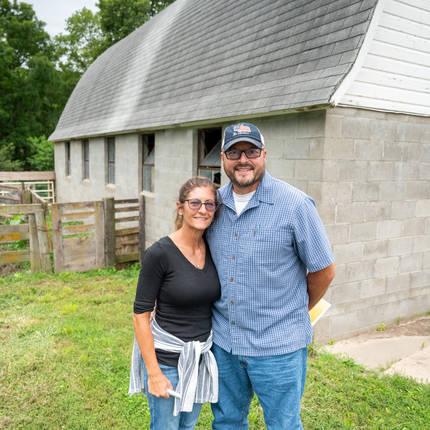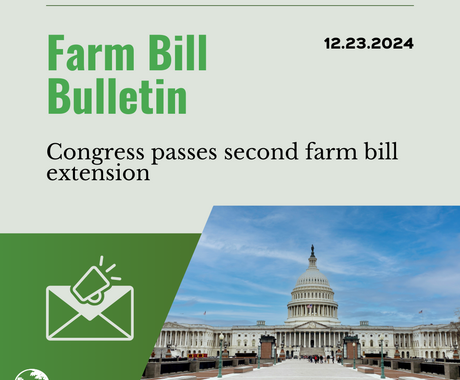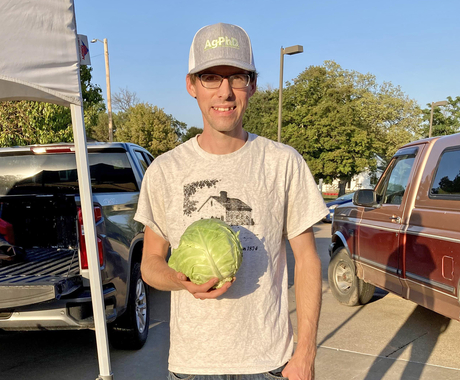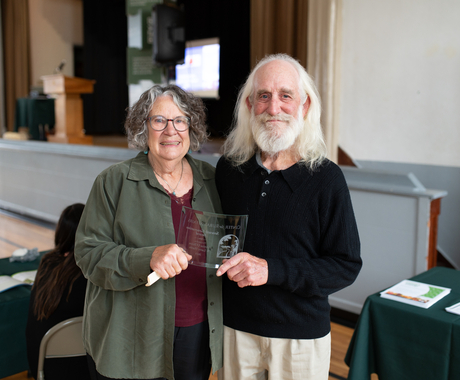Gus and Stephanie Leigh moved their family from Las Vegas to northeast Nebraska to create something new while giving back to their loved ones and nurturing the land.
After Gus, an Army veteran, retired in 2023 from a 20-year career in law enforcement, he and Stephanie eagerly accepted an opportunity to leave bustling Las Vegas behind to pursue agricultural aspirations. Gus inherited about 55 acres of farmland from his parents, and although the property had been neglected for more than three decades, the Leigh family was up to the challenge of making it shine again.
Accompanied by Stephanie's mother and their youngest daughter, they moved to Neligh to be closer to his parents and start their farm. Their two-story, red-roofed farmhouse and their operation, NE-Leigh Farm, is on the eastern outskirts of town.
“We envision establishing a farm-to-table enterprise that produces pasture-raised eggs, chickens, turkeys, and pigs, as well as grass-raised beef for sale to our local community and online markets, while setting a standard in regenerative agriculture,” Gus said.
Their main goal was to implement conservation practices and regenerative farming, and they applied for and were accepted into the Center for Rural Affairs Beginning Farmer Conservation Fellowship Program.
The program began in 2022 with eight individuals, plus mentors. The most recent cohort began in spring 2024 with eight more beginning farmers, including Gus and Stephanie.
The Leighs are no strangers to the Center, as they’ve participated in other programs sponsored by the organization, including the AgVets agrotourism workshops. So when the Center announced the opening of enrollment in the current cohort of conservation fellows, the couple eagerly submitted their application.
They have gone to great lengths to improve the environment and their farm. They prohibit the use of steroids, hormones, or antibiotics on their livestock. Chickens and pigs roam and forage freely, and both are processed on site to ensure a zero-waste approach.
Gus and Stephanie have also committed themselves to minimizing the leaching of nitrate into the soil and groundwater through the implementation of rotational grazing practices. They are planting a diverse array of grasses in their pasture, which will enhance biomass both above and below ground and reduce the risk of nitrate leaching deep into the soil or running off into their water supplies.
As part of the program, conservation fellows design and implement a project on their own farms or land they are farming. They present their findings at a farm tour to their mentors, project partners, and other beginning farmers.
Gus and Stephanie have seen a decline in native grasses and forbs on their land, as well as a reduction in native insects, birds, and wild foraging animals like deer. For their conservation project, they are planting native grasses, forbs, and wildflowers, and with the help of their livestock, they hope to increase the populations of both above-ground and below-ground species.
“We believe these plants will attract pollinating insects and birds, as well as enhance the underground soil microbiology,” Gus said. “We anticipate an increase in wildlife populations such as pheasants, turkeys, and deer. We also designated a plot that will be utilized to establish a Milpa garden to produce food for local food banks.”
The Milpa technique originated in Central America and involves planting the Three Sisters—corn, squash, and beans—alongside other native and cultivated plants to improve the soil and grow food.
Gus and Stephaie’s project is in its initial stages, with Milpa seeds sown in a paddock that was home to their pigs for several weeks, and now they are seeing some growth of corn, sunflowers, and winter squash.
Gus says one of the most valuable lessons they have learned is the realization that they are not alone in their commitment to conservation.
“The classes and in-person events we have attended have underscored the importance of soil conservation, grassland preservation, and livestock rotation,” he said. “Through our interactions and work with our mentor, we have gained insights into improving our pastures and enhancing our strategies for marketing and selling our finished livestock.”
Looking down the road, Gus hopes they can eventually generate enough income to support their farming operation independently. He’s grateful they were chosen for the conservation fellowship and wholeheartedly recommends the program to his peers.
“It is a profound honor to be selected as a fellow,” Gus said. “Being awarded this fellowship has been instrumental in expanding our knowledge of conservation practices, particularly those that have proven successful in Nebraska.”
And, though there aren’t many other farmers and ranchers in their area that practice regenerative agriculture or employ conservation methods, Gus says he and Stephanie are staying the course.
“We are committed to applying the lessons and experiences we have gained throughout our lives to enhance our farm, better ourselves, and support other farmers, ranchers, and our community,” he said. “Having worn a uniform for over 30 years, I am now ready to take on the role of my own boss and dedicate myself to improving our small family farm with my wife. With my wife as both co-owner and teammate, and guided by the good Lord and values we hold dear, I am confident that we will build a successful and prosperous farming business.”
The Beginning Farmer Conservation Fellowship is a program of the USDA-NRCS under agreement number NR243A750003C010 Conservation Outreach: Equity Conservation Cooperative Agreements.





